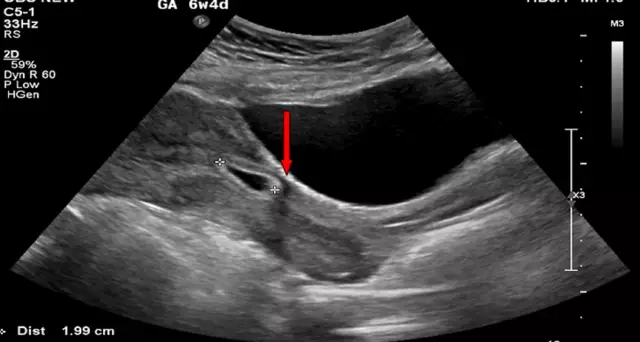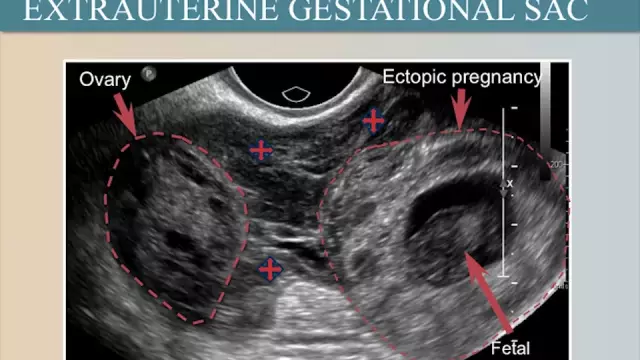- Author Rachel Wainwright wainwright@abchealthonline.com.
- Public 2023-12-15 07:39.
- Last modified 2025-11-02 20:14.
Menstruation after an ectopic pregnancy
An ectopic pregnancy is a pregnancy complication in which a fertilized egg attaches outside the uterus. This condition is very dangerous for a woman's life, as it can be accompanied by such complications as internal bleeding. Most ectopic pregnancies occur in the fallopian tube (in 98% of cases), so-called tubal pregnancies, much less often in the cervix, ovaries and abdomen. An ectopic pregnancy is a medical emergency as it can be fatal if not treated properly and on time.

The first menstruation after an ectopic pregnancy, according to most experts, if there are no complications after the operation, should begin 28-40 days after the termination of the pregnancy.
In cases where bleeding appears earlier than 25 days after the termination of an ectopic pregnancy, they are regarded not as menstruation, but as uterine bleeding, which requires consultation with a gynecologist. If there is a delay in menstruation after an ectopic pregnancy for more than 40 days, this indicates that, most likely, a hormonal failure has occurred, which again is a reason to consult a gynecologist.
Ectopic pregnancy symptoms
An ectopic pregnancy is accompanied by the same symptoms as a normal pregnancy, namely:
- Toxicosis;
- Delay or scarcity of menstruation;
- Swelling and tenderness of the mammary glands;
- Changes in basal temperature.
When conducting a pregnancy test, an ectopic pregnancy can be determined by the level of human chorionic gonadotropin in the urine - it will be an order of magnitude higher than in a normal pregnancy.
The specific symptoms of an ectopic pregnancy are:
- Increasing pain in the lower back, in the place of attachment of the ovum and in the lower abdomen;
- Scanty brownish-red discharge from the first days of pregnancy;
- Pressure change;
- Dizziness and general weakness of the body.
With an ectopic pregnancy, a rupture of the fallopian tube can occur, which is accompanied by loss of consciousness, dizziness, sharp abdominal pain, pain in the area above the collarbone and dry mouth, therefore it is very important to be in the hospital during this period, as intra-abdominal bleeding can occur. If your period is delayed after an ectopic pregnancy, the appearance of bloody, scanty and spotting discharge, you must urgently consult a doctor.
Causes of an ectopic pregnancy
Damage to the fallopian tube is often the main cause of ectopic pregnancy. A fertilized egg can enter the damaged section of the tube and begin to develop there.
The causes and risk factors for an ectopic pregnancy can also be:
Smoking. Women who smoke or quit smoking are at a higher risk of developing an ectopic pregnancy, as smoking affects the ability of the fallopian tubes to transport a fertilized egg to the uterus
- Pelvic inflammatory disease (chlamydia);
- Postponing earlier surgery on the fallopian tubes;
- Transfer of an ectopic pregnancy earlier in the fallopian tube;
- Hormonal imbalance;
- Anatomical features of the fallopian tubes.
Why is there a delay in menstruation after an ectopic pregnancy?
Menstruation after an ectopic pregnancy begins in most women with a slight delay, since the period of restoration of the menstrual cycle directly depends on the psychological and physiological state of the woman. The ideal period for restoring the cycle of menstruation after an ectopic pregnancy is considered to be the period from the 28th to the 40th day after the operation in those cases when there were no complications. The bleeding that occurs before this period is not monthly, but uterine bleeding and, like the delay in menstruation after the ectopic, requires consultation with a gynecologist.
Delayed menstruation or uterine bleeding may occur due to the late detection and elimination of an ectopic pregnancy, which affect the recovery period of the body after surgery. Also, the delay in menstruation after an ectopic pregnancy can be influenced by the transfer of severe shocks or the occurrence of stressful situations. According to reviews, in such cases, the cycle can recover in 1.5-2 months.
In order to help the body recover faster after the operation, it is necessary to completely abandon the intake of alcoholic beverages, drugs and tobacco smoking, lead a moderately active lifestyle (engage in light physical exercises), do not lift weights, get enough sleep, take vitamin and mineral complexes, follow the advice of the attending physician, and in some cases, if there is psychological stress, consult a psychologist.

It is important to know that even if the menstrual cycle recovered on time and there were no complications after an ectopic pregnancy, a subsequent pregnancy should not take place in the next 5.5-6 months. Despite the rapid recovery of menstruation after an ectopic pregnancy, the body is not ready for a new pregnancy, so during this period it is necessary to use protection.
Monthly after an ectopic pregnancy and its prevention
Effective prevention of ectopic pregnancy and inflammatory diseases lies in the correct intake, without missing pills, hormonal contraceptives.
After the diagnosis of an ectopic pregnancy is confirmed and if the tube has not ruptured, laparoscopy is performed, in which doctors either completely remove the fallopian tube or remove the fertilized egg that is in it. In cases where the tube is left, there is a risk of recurrence of an ectopic pregnancy in it in the future, as its functions are disrupted and adhesions are formed, which leads to obstruction of the tube. Removing the tube completely reduces the likelihood of natural pregnancy.
When carrying out operational or drug treatment, menstruation after an ectopic pregnancy should begin in the period from 28 to 40 days after the operation.
There is also a medical method of getting rid of an ectopic pregnancy, which occurs in cases where the fetus is alive and continues to develop. The action of these medicines is aimed at stopping the development of the fetus. This method of eliminating ectopic pregnancy has a number of side effects, including baldness, liver and kidney damage.
The subsequent ectopic pregnancy should be planned no earlier than six months after the complete restoration of tissues and menstruation after an ectopic pregnancy, in order to reduce the risk of its recurrence.
It is also very important to find out what caused the ectopic pregnancy and completely neutralize this factor, then the risk of a second ectopic pregnancy will be reduced.
YouTube video related to the article:
Found a mistake in the text? Select it and press Ctrl + Enter.






